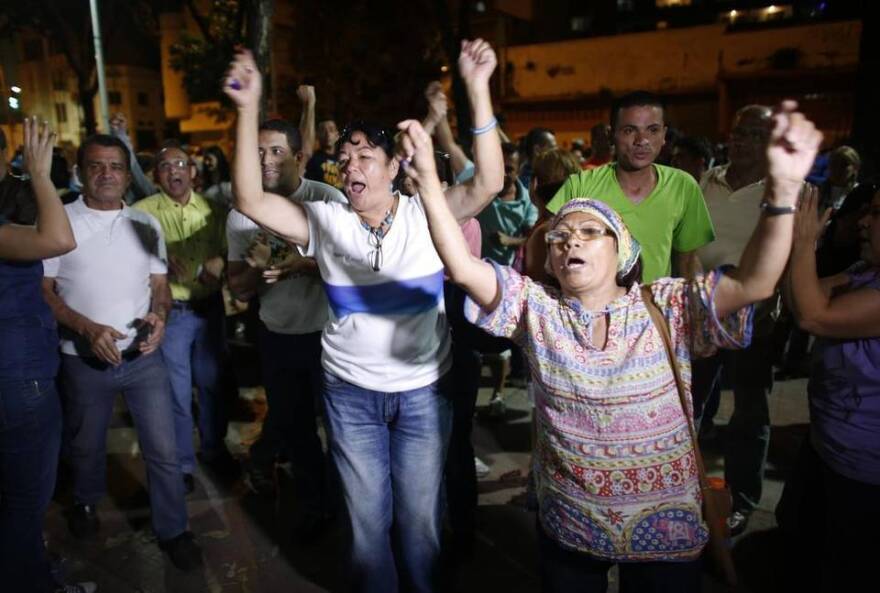The vast Caracas slum known as Catia was a cradle of the late Hugo Chávez’s socialist revolution. Now it looks more like his regime’s coffin.
Few barrios have been hit as hard by Venezuela’s economic and social collapse after 17 years of left-wing rule. By the world’s highest inflation rate. By South America’s worst murder rate. By an orgy of government corruption. And by the long and beleaguering lines people endure every day for scarce food and medicine – a perverted postcard from the Western Hemisphere’s most oil-rich nation.
Yet last month a local socialist congressional candidate, Jacqueline Faría, made the delusional remark that real revolutionaries find those epic food queues “enjoyable.”
RELATED: Time To Stop The Crying Game In Venezuela - And Start The Waiting Game
So it’s little wonder that in Sunday’s parliamentary elections, most Catia residents scorned the leftist candidates backed by Chávez’s successor, President NicolásMaduro, and voted instead for the more centrist opposition – as did folks in "Chavista" strongholds all over Venezuela.
It’s the key reason Maduro’s socialist party didn’t just lose control of the National Assembly – it got handed its radical rear end. The opposition looks to have won a supermajority of two-thirds of the Assembly’s seats.
“Everybody that is against what is happening in Venezuela today is opposition, regardless of being with the revolution or not,” says Pedro Vasquez, a South Florida Venezuelan expat and U.S. spokesman for Voluntad Popular, or Popular Will, one of the opposition alliance parties.
The socialists have been telling Venezuelans to eat fried rocks. -Marialbert Barrios
Marialbert Barrios, an opposition congressional winner in Catia, put it best: The socialists, once the champions of Venezuela’s poor when oil revenues were sky-high, were routed on Sunday because these days, as crude prices plunge, “they’ve been telling Venezuelans to eat fried rocks."
Venezuela's power shift is tectonic – and it's another big sign, on top of last month’s presidential victory by the center-right in Argentina, that the far left is on the far outs in Latin America.
It also gives Venezuela a chance now to become something more than the corrupt and dysfunctional petro-republic it’s been for most of its history. (And please, Venezuelan expats, spare me the bull about Venezuela being a democratic paradise before Chávez. If it had been, Chávez never would have come to power.)
What happens next is vital. First, Maduro and the other Chavista ideologues have to resist the urge to ruin this historic moment.
Maduro, who blames Venezuela's crisis on right-wing conspiracies, did concede his party’s landslide defeat Sunday night. But he’s still more than capable of lashing out. He could, as many fear, hand himself sweeping new executive powers and effectively shut down the Assembly before the opposition can take control of it next month.
RUTHLESS REVOLUTION
“Maduro’s desperation is growing by the day,” says former Venezuelan prosecutor Franklin Nieves – who claims he knows first-hand how ruthless the revolution can get.
Last year, Nieves was assigned to try opposition leader LeopoldoLópez for inciting anti-government violence. He told me he quickly realized “there was no credible evidence.” His critics question why he stayed on the case – but he says Venezuelan state security agents forced his hand by threatening to harm his family if he quit.
López was convicted and sentenced to 14 years in prison in September. Weeks later, Nieves, his wife and two daughters defected to Miami, where they’re seeking U.S. asylum.

Nieves points out that what spooks Maduro now is the fact that an opposition-led Assembly could “make Venezuela’s judicial system independent again” and free López and other political prisoners. The opposition would also be in a stronger position to hold a presidential recall referendum in 2016, which would likely oust Maduro – and set up a special election to replace him. López might well be a contender.
Still, don’t discount the fragmented opposition’s notorious capacity for screwing up – which, after all, helped keep the socialists in power for so long.
Perhaps most important, it needs to keep in mind that the revolution’s faithful didn’t vote for the opposition on Sunday so much as it voted against the revolution.
If a special presidential election is held next year, opposition polswill have to turn that mindset the other way. That means hauling their sifrino (yuppie) khakis into working-class quarters like Catia and ensuring poorer voters that overthrowing the revolution doesn’t mean throwing out the benefits they received under that regime.
“We’ve gotten better at connecting with the Chavista base,” says Mario di Giovanni, a Venezuelan opposition activist who’s now a Miami political consultant. “But we need to keep reaching out.”
After Sunday, the least the opposition can do for those Venezuelans is give them a future of more than fried rocks.






